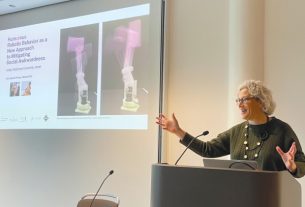The seven successful applicants will receive funding through the UK Research and Innovation (UKRI) Technology Missions Fund and the UK’s National Quantum Computing Centre (NQCC). This is part of a funding competition delivered by Innovate UK.
They will be supported to undertake development, build and commissioning activities, to deploy an operationally ready quantum computing testbeds at NQCC.
The announcement was made by UK Science Minister, Andrew Griffith and marks an important milestone in the UK’s journey to develop world-leading quantum computing infrastructure.
Advancing the field
Traditional quantum computing research and development has relied heavily on theoretical approaches that do not always translate to practical application.
The testbeds supported by this investment will address this issue by providing prototype hardware on which to run and refine quantum algorithms.
All winning companies will build, commission, and conduct initial testing and evaluation phases of a testbed system.
Solving big problems
Collectively, these testbed systems will help to identify which types of quantum computer work best for solving different types of problems and support the development of large-scale quantum computers.
This will help explore possible solutions to some of our greatest challenges in society.
At the end of the projects, the testbeds will be considered for assessment through NQCC’s testbed evaluation programme, to test and validate their performance capabilities and carry out research on applications development.
Helping UK businesses
Dr Kedar Pandya, UKRI Technology Mission Fund Senior Responsible Owner and Executive Director of Cross-Council Programmes at the Engineering and Physical Sciences Research Council, said:
We are on the brink of a quantum technology revolution that is poised to transform diverse industries from the financial sector to healthcare, and UKRI is committed to ensuring the UK’s place at the forefront of this.
We are providing our world-leading businesses and institutions the resources and tools needed to build a strong foundation in quantum computing with the potential to scale their activities for long-term competitive advantage.
This investment will help our researchers and innovators develop the blueprint for quantum computing hardware and software and secure the UK’s place in this developing field.
Far-reaching change
Professor Will Drury, Executive Director, Digital and Technologies at Innovate UK said:
Quantum technologies have the potential to meet some of the greatest challenges society faces.
By unleashing computing power that goes far beyond existing digital technology, we can reach new frontiers in sensing, timing, imaging, and communications.
This could be transformative for life in the UK and will create new, well-paid jobs that will boost our future economy.
Showcase, demonstrate, evaluate
In establishing these quantum testbeds, NQCC is aiming to showcase, demonstrate and evaluate the capabilities of different hardware solutions.
Current quantum computers differ primarily according to the type of quantum information, or qubits, that they use to store and transmit data.
Taking different approaches
The winning companies will use different technology platforms to help in full understanding of the advantages and challenges associated with common quantum computing approaches.
They are:
- Aegiq, Sheffield
- Cold Quanta UK, Warwick
- ORCA Computing, London
- Oxford Ionics, Oxford
- Rigetti UK, London
- Quantum Motion, London
- QuEra Computing, Exeter
As a result, the seven projects will include a diverse range of qubit architectures that could offer a pathway to fault-tolerant quantum computing.
Building a strong foundation
Dr Michael Cuthbert, Director of NQCC, commented:
My congratulations to the lead providers of our seven awarded quantum testbeds.
Over the coming 15 months these prototype quantum computing platforms will be deployed into the newly established NQCC facility providing us with a valuable insight into the maturity, characteristics, and capabilities available across a range of hardware architectures.
The next phase of the NQCC will be one of huge promise establishing a unique state-of-the-art facility with on-premises access to a range of qubit modalities at scale.
Shaping the future
UK Minister of State for the Department for Science, Innovation and Technology, Andrew Griffith MP, said of the UK’s commitment to quantum computing including this investment:
As we steer towards a quantum-enabled economy by 2033, this funding underscores our commitment to push the boundaries of innovation.
From world-leading quantum computing testing facilities to expediting public sector adoption, we are shaping a future where quantum technologies will revolutionise our society.
This investment is not just monetary, it is an investment in the limitless potential of quantum, propelling the UK into a new era of technological prowess and economic growth.
Getting quantum ready
This announcement comes on the same day as the announcement of the winners of the £15 million Quantum Catalyst Fund, also delivered by Innovate UK.
Both initiatives will enable quantum technologies to be used in real-life applications, both in the private and public sector.
Further information
The competition is sponsored by NQCC, which is based at the Science and Technology Facilities Council Rutherford Appleton Laboratory in south Oxfordshire.
Each company will benefit from NQCC’s unique expertise as part of NQCC’s growing community of leading UK quantum computing research teams.
The knowledge and skills exchange that the awards will facilitate will play a key role in fostering the UK’s quantum computing ecosystem. It will also position the UK at the forefront of this rapidly advancing technology.
NQCC is a part of UKRI through the National Quantum Technologies Programme (NQTP).
2024 marks the first decade of NQTP. The £1 billion programme of investment has built leading capabilities in:
- quantum computing
- sensors
- imaging
- communications
- quantum position, navigation and timing
It has unlocked new capabilities that are:
- making a real difference to our everyday lives
- helping to bring new technologies to market
- paving the way for the next generation of a highly skilled quantum workforce
Top image: Credit: Andrey Suslov, iStock, Getty Images Plus via Getty Images



